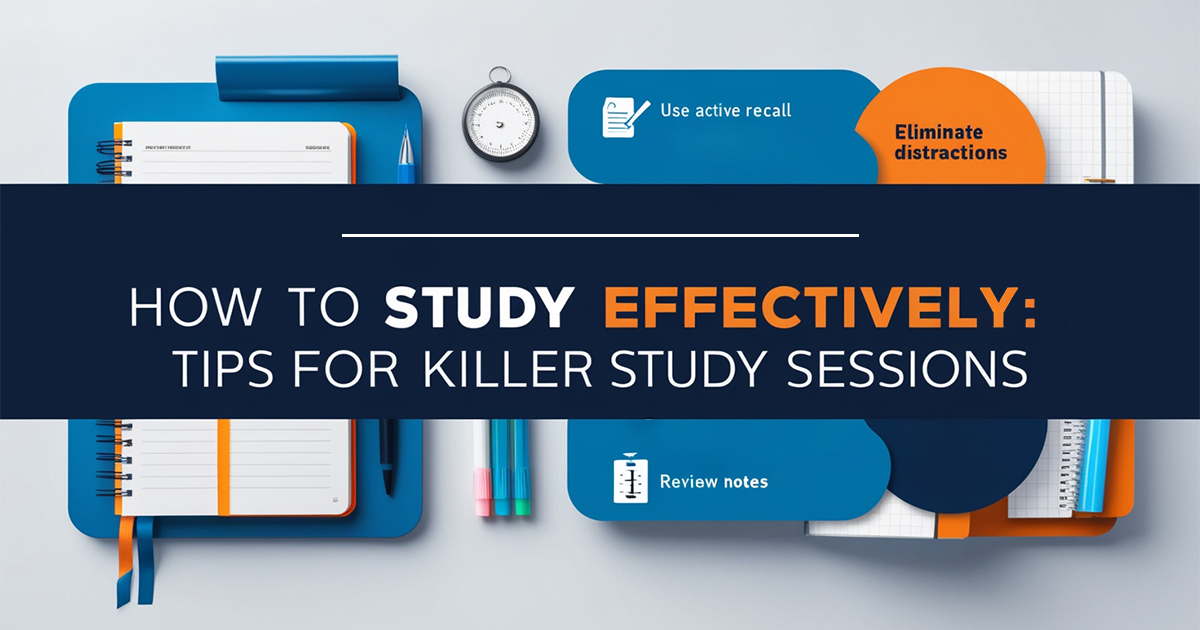Blog Detail


How to Study Effectively: Tips for Killer Study Sessions
25-10-2024

Some students often feel their study habits are not as effective as they need to be. They might wonder how to study effectively so that they can improve their performance in both class and exams. It is common for students to find that the study methods they used in high school aren’t as effective as in college. This makes sense, as college presents a different set of challenges. Professors tend to be less involved on a personal level, class sizes are larger, exams carry more weight, reading assignments are more demanding, and courses are generally more challenging. This doesn’t reflect any personal shortcomings; rather, it highlights the need to adopt more efficient study techniques. Fortunately, there are numerous strategies that can help students succeed in university-level courses. Let us look at some of the proven study tips for students that can guide them on how to study effectively:
Stay Organised
Good organisation is the foundation of effective studying. Using a planner to track deadlines helps avoid last-minute work and ensures that students have time to study. Being aware of one’s schedule and preparing all necessary materials the night before increases productivity. An organised system supports active participation and better focus during classes.
Active Participation
Regular class attendance is critical for success. Skipping classes leads to missed information and gaps in understanding. Attending lectures and actively engaging with the material helps students grasp concepts better. Students should ask questions and participate in discussions to reinforce learning. They must also avoid distractions like phones to fully benefit from the class.
Staying Up-to-Date with Notes
Taking detailed notes helps retain information. This is one of the most effective study tips for students, where organised notes become valuable resources for further study sessions. Students may write down key points and organise them clearly, using headings, highlights, or visual aids like charts and diagrams. If they miss a class, they must take the initiative to borrow notes from a classmate to stay up to date.
Engaging with Teachers
Engaging with teachers is a crucial aspect of how to study effectively, as they are excellent resources for clarifying concepts. Students must use office hours to ask questions and get feedback on assignments. Building relationships with teachers shows the students’ commitment and can provide deeper insights into the subject matter. Engaging with teachers can significantly improve students’ understanding and performance.
Spaced Learning & Study Plan
To understand how to study effectively, spaced learning and having a study plan are essential. Consistent, spaced-out review helps retain information long-term and prepares them better for exams. Moreover, developing a study schedule helps manage time efficiently. Allocating study blocks for each subject helps disintegrate larger tasks into smaller chunks. This approach prevents last-minute cramming and ensures comprehensive coverage of the material.
Group Study
Group study can be highly beneficial for students seeking to enhance their learning experience. It fosters a sense of motivation as working alongside peers creates a shared environment where everyone encourages each other to stay on track. The diversity of perspectives within a group allows students to approach topics from different angles, deepening their understanding of complex concepts.
Practicing Past Year & Sample Papers
Practicing past-year question papers and sample papers is an effective study technique that helps students familiarise themselves with the exam format. This reduces anxiety and boosts confidence during the actual exam. By working through these papers, students can identify key areas of focus. It also enhances time management skills, allowing students to gauge how much time to allocate for each section, ensuring they can complete the exam within the given timeframe.
Active Learning
Another aspect of how to study effectively is adopting the style of active learning. This is a study technique that encourages deeper engagement with the material, leading to better understanding and retention. Unlike passive learning, which involves simply reading or listening, active learning requires students to interact with the content in meaningful ways. This might include summarising information in their own words, asking questions, teaching concepts to others, or applying knowledge to real-world problems.
Final Thoughts
Students must adopt smarter strategies, including staying organised and actively participating in class for better understanding. Engaging with teachers is equally important, as it provides clarity on complex concepts and fosters a deeper understanding of the material. Techniques such as spaced learning, group study, and practicing past papers further enhance understanding and retention. Active learning, where students engage deeply with the material, helps solidify concepts and improves performance. By using these methods, students can learn how to study effectively, thereby boosting both their academic success and overall preparedness for future endeavours.